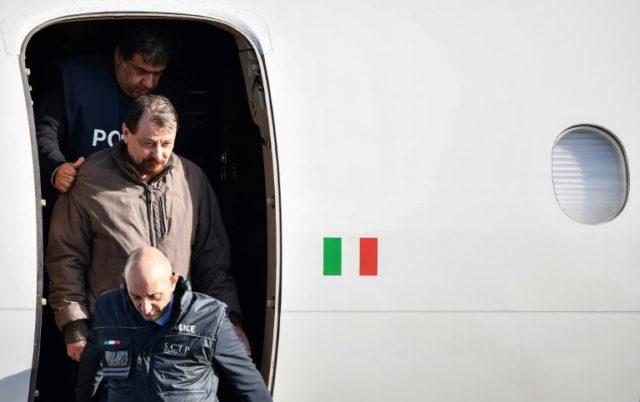Rome (AFP) – Former communist militant Cesare Battisti, wanted in Italy for four murders in the 1970s, began serving a life sentence in a Sardinian prison on Monday after an international police squad tracked him down and arrested him in Bolivia.
Jailed in 1979 for belonging to an armed revolutionary group outlawed in Italy, Battisti escaped from prison two years later, and had spent nearly four decades on the run.
An Italian-flagged Falcon 900 plane carrying Battisti landed at Rome’s Ciampino airport on Monday morning.
Battisti, who was not wearing handcuffs, smiled grimly as he was escorted off the plane by a dozen policemen.
“I know that I’m going to prison,” an apparently resigned Battisti said, according to police.
The 64-year-old was later transferred to a prison on the island of Sardinia “for security reasons”, according to Justice Minister Alfonso Bonafede, where he begins his life sentence with six months in solitary confinement.
Oristano prison is home to more than 250 convicts, many of them living under the tough “41-bis” prison regime usually applied to Mafia members.
“This is not the finish line but the starting point,” Italy’s far-right Interior Minister Matteo Salvini told journalists at Ciampino, citing the presence of “dozens” of other former militants still on the run in countries from Latin America to France.
Italy had repeatedly sought the extradition of Battisti, who lived in Brazil for years under the protection of former leftist president Luiz Inacio Lula da Silva, himself now in prison for corruption.
Battisti was seized without a struggle late Saturday in the Bolivian city of Santa Cruz de la Sierra in an operation carried out by a joint team of Italian and Bolivian officers.
– ‘It’s over’ –
Battisti was sentenced to life imprisonment for having killed two Italian policemen, taking part in the murder of a butcher and helping plan the slaying of a jeweller who died in a shootout that left his teenage son in a wheelchair.
“It’s over, now the victims can rest in peace,” said Alberto Torregiani, the son of the slain jeweller.
Battisti has admitted to being part of the Armed Proletarians for Communism, a radical group that staged a string of robberies and attacks, but he has always denied responsibility for any deaths, painting himself as a political refugee.
Rome is determined to punish one of the key figures from Italy’s so-called Years of Lead, a decade of violent turmoil which began in the late 1960s and saw dozens of deadly attacks by hardline leftwing and rightwing groups.
During his election campaign, Brazil’s far-right President Jair Bolsonaro — who took office on January 1 — vowed that if elected he would “immediately” send Battisti back to Italy.
Battisti had filed for asylum without receiving any response from authorities, Bolivia’s ombudsman said in an article published in the local El Deber de Santa Cruz newspaper.
The ex-communist militant had been hoping to find favour with Bolivia’s left-wing President Evo Morales after saying in his asylum request he had been forced to quit Brazil due to “the ominous coincidence” that Italy and Brazil were both now run by “far-right” governments.
Salvini and Bolsanaro have been basking in the success of Battisti’s capture on social media.
European Parliament President Antonio Tajani, a member of Italy’s right-wing Forza Italia, criticised the presence of “a cohort of political admirers” for Battisti’s arrival.
Others noted that while Salvini and Bonafede were present at Ciampino, only non-partisan President Sergio Mattarella had received the body of journalist Antonio Megalizzi, 29, who was murdered in an Islamist attack in Strasbourg in December.
– Italian anger –
Since his jailbreak Battisti had reinvented himself as an author, writing a string of noir novels. In 2004, he skipped bail in France, where he had taken refuge. He then went to live clandestinely in Brazil until he was arrested in 2007 in Rio de Janeiro.
After years in custody, then-president Lula issued a decree — later upheld by Brazil’s Supreme Court — in 2010 refusing Battisti’s extradition to Italy, and he was freed, angering Rome.
Battisti, who has a five-year-old Brazilian son, in 2017 told AFP he would face “torture” and death if he were ever to be sent back to Italy.
burs-cjo/boc

COMMENTS
Please let us know if you're having issues with commenting.